|
Tra la, it's May, it's May, the lusty month of May. That lovely month
when apparently everything old is revisited again, as my mailbox is just
bursting with reissues, some of them being very welcome indeed.
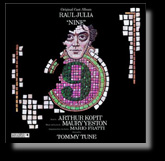 The most welcome and the largest reason to rejoice is that the original
Broadway cast recording of one of my all time favorite musicals has been
reissued in its highly expanded glory. Nine, which is currently
enjoying a successful revival on Broadway, was the first musical I fell in
love with. And while one cannot truly be objective about one's first love,
I believe it has held up rather well. Yes, it does at times resemble
Fellini For Dummies in its streamlined approach to adapting his
classic film, 8 1/2. Yes, Raul Julia was never the world's surest
singer (but he does approach the title of being one of the world's most
passionate). Yes, some of Maury Yeston's rhymes are a bit forced (although
I never have been bothered by the pairing of "Italian" and "Rapscallion").
However, when the overture starts, with its 'orchestra' comprised of the
women of importance in the life of Fellini's alter ego, Guido Contini
(Raul Julia), my heart literally skips a beat and I am insanely happy. The most welcome and the largest reason to rejoice is that the original
Broadway cast recording of one of my all time favorite musicals has been
reissued in its highly expanded glory. Nine, which is currently
enjoying a successful revival on Broadway, was the first musical I fell in
love with. And while one cannot truly be objective about one's first love,
I believe it has held up rather well. Yes, it does at times resemble
Fellini For Dummies in its streamlined approach to adapting his
classic film, 8 1/2. Yes, Raul Julia was never the world's surest
singer (but he does approach the title of being one of the world's most
passionate). Yes, some of Maury Yeston's rhymes are a bit forced (although
I never have been bothered by the pairing of "Italian" and "Rapscallion").
However, when the overture starts, with its 'orchestra' comprised of the
women of importance in the life of Fellini's alter ego, Guido Contini
(Raul Julia), my heart literally skips a beat and I am insanely happy.
Upon hearing the reissue, I am made even more delirious with joy. When
Nine was originally recorded, budgetary deficiencies made it close
to impossible to record the cast album in the typical manner of
scheduling individual sessions for specific numbers, recording the vocals
and orchestra separately, etc. The solution was to simply record the show
in its entirely three times and compile a cast recording from the various
takes. This, perhaps, explains why the cast album has a sense of intimacy
and immediacy that is missing from a great number of perfectly, albeit
slickly, recorded musicals. Due to time constraints associated with LPs,
the original cast recording (and its original CD reissue) was limited to a
72 minute version. A cassette release included an additional fifteen
minutes of material, but the latest Columbia reissue has preserved almost
every note and a great deal of dialogue on a two disc set (why they did
not simply present the show in its entirety is a valid, if quibbling,
disappointment, however).
Thus, we now get a much truer picture of the show and, more importantly,
how the songs fit into the framework of the piece. To hear the argument
between Guido (Raul Julia) and his wife Luisa (Karen Akers), which starts
off the show, is to understand the stakes for what follows. Having the
press conference and its rather personal questioning of the long suffering
and highly poised Luisa as a lead-in to the poignant "My Husband Makes
Movies" is to gain a deeper understanding of what she has given up for her
husband. Additional material in "Folies Bergeres" and "Unusual Way"
further clarifies Guido's conflicts and the storyline of the show.
Combine all that with a newly cleaned up recording, insightful liner notes
by composer/lyricist Maury Yeston and producer Mike Berniker, and
previously unreleased photos, and you have a valid excuse to purchase this
reissue. The fact that it also includes Maury Yeston singing and playing
three demo tracks: "The Germans at the Spa," "The Grand Canal," and
"Unusual Way" (the last of which provides quite an illustration on the
evolution of a song and how just minor tweaking can turn a decent number
into a masterpiece) is an added bonus.
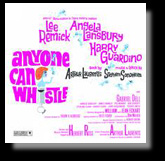 Columbia has also released four other reissues, three of them cult
classics, all of them deserving of being in one's collection in one form
or another. The most necessary for musical theater aficionados is Stephen
Sondheim's glorious failure (in terms of interest generated versus length
of run), Anyone Can Whistle. While nothing new has been added to
the original cast album's material, the sound quality is greatly improved
and is considerably less muddled in its mix, which is reason alone to
upgrade. Angela Lansbury, as the crooked mayor who manufactures a miracle
to save her impoverished town, benefits greatly from the process and
sounds less strident than on the original release. Columbia has also released four other reissues, three of them cult
classics, all of them deserving of being in one's collection in one form
or another. The most necessary for musical theater aficionados is Stephen
Sondheim's glorious failure (in terms of interest generated versus length
of run), Anyone Can Whistle. While nothing new has been added to
the original cast album's material, the sound quality is greatly improved
and is considerably less muddled in its mix, which is reason alone to
upgrade. Angela Lansbury, as the crooked mayor who manufactures a miracle
to save her impoverished town, benefits greatly from the process and
sounds less strident than on the original release.
What will be of
particular interest to Sondheim fans is five bonus tracks culled from his
own private collection that feature Sondheim on piano and vocals. Three
of them will prove to be especially delightful: "The Lame, The Halt and
the Blind" (cut from the show), "I'm Like The Bluebird" (which opens the
show but was never recorded) and a version of "With So Little To Be Sure
Of" with an alternate melody and lyrics.
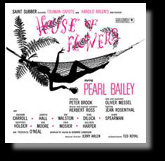 One of the most beautiful cult musicals around has to be House of
Flowers
. Based on a story by Truman Capote about a house of 'flowers'
(or to be more specific, a bordello), the show featured an incredible cast
that included Pearl Bailey, Juanita Hall (the original Bloody Mary in
South Pacific) and a then unknown 18-year old Diahann Carroll. The
score by Harold Arlen is truly breathtaking and introduced such gems as "A
Sleeping Bee," "I Never Has Seen Snow," "Two Ladies In The Shade Of The
Banana Tree," and "Don't Like Goodbyes." The current reissue has restored
two tracks to the cast album, "Slide, Boy Slide" and "Mardi Gras Waltz,"
the latter of which was believed to have long since disappeared. Additional
bonus tracks include a Percy Faith version of "Mardi Gras Waltz" and a
studio recording Enid Mosier made of "Two Ladies In the Shade of the
Banana Tree." More intriguing, however, is a reading by Truman Capote of
"Ottilie And The Bee," the section of his book that inspired the song "A
Sleeping Bee," and a demo of that song by Harold Arlen. The liner notes,
which describe in great detail the goings on behind the scenes in the
show's creation, are almost worth the price of the disc alone. One of the most beautiful cult musicals around has to be House of
Flowers
. Based on a story by Truman Capote about a house of 'flowers'
(or to be more specific, a bordello), the show featured an incredible cast
that included Pearl Bailey, Juanita Hall (the original Bloody Mary in
South Pacific) and a then unknown 18-year old Diahann Carroll. The
score by Harold Arlen is truly breathtaking and introduced such gems as "A
Sleeping Bee," "I Never Has Seen Snow," "Two Ladies In The Shade Of The
Banana Tree," and "Don't Like Goodbyes." The current reissue has restored
two tracks to the cast album, "Slide, Boy Slide" and "Mardi Gras Waltz,"
the latter of which was believed to have long since disappeared. Additional
bonus tracks include a Percy Faith version of "Mardi Gras Waltz" and a
studio recording Enid Mosier made of "Two Ladies In the Shade of the
Banana Tree." More intriguing, however, is a reading by Truman Capote of
"Ottilie And The Bee," the section of his book that inspired the song "A
Sleeping Bee," and a demo of that song by Harold Arlen. The liner notes,
which describe in great detail the goings on behind the scenes in the
show's creation, are almost worth the price of the disc alone.
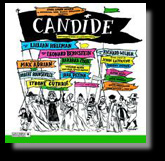 The original cast recording of Candide has always been an
intriguing cult classic. While Voltaire's satiric story of a hapless
innocent who should have gone by the name of Job rather than Candide made
for an odd marriage when combined with Leonard Bernstein's operetta
influenced score, the songs and the performances provide a glorious
listen. The reissue of Candide lacks bonus tracks sufficiently
enticing for one to repurchase it (an alternate version of its overture
conducted by its author, Leonard Bernstein, with the New York
Philharmonic), but the remarkable clarity of the remix more than makes up
for any deficiencies of extras. To hear the overture, which rivals
Gypsy for most stirring overture ever written, cleaned up and more
sharply defined is breathtaking and makes one think that one is listening
to it live in a symphony hall. Likewise, the vocals have been given a
sparkle and edge that makes one think one is hearing a new recording.
Barbara Cook's tour de force "Glitter And Be Gay" especially gains greater
beauty and clarity in the process. The original cast recording of Candide has always been an
intriguing cult classic. While Voltaire's satiric story of a hapless
innocent who should have gone by the name of Job rather than Candide made
for an odd marriage when combined with Leonard Bernstein's operetta
influenced score, the songs and the performances provide a glorious
listen. The reissue of Candide lacks bonus tracks sufficiently
enticing for one to repurchase it (an alternate version of its overture
conducted by its author, Leonard Bernstein, with the New York
Philharmonic), but the remarkable clarity of the remix more than makes up
for any deficiencies of extras. To hear the overture, which rivals
Gypsy for most stirring overture ever written, cleaned up and more
sharply defined is breathtaking and makes one think that one is listening
to it live in a symphony hall. Likewise, the vocals have been given a
sparkle and edge that makes one think one is hearing a new recording.
Barbara Cook's tour de force "Glitter And Be Gay" especially gains greater
beauty and clarity in the process.
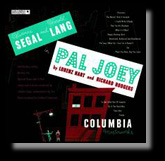 Essential mainly for curiosity and completist sake is the 1950 studio
recording of Rogers and Hart's Pal Joey. Its original 1940
production was a critical and commercial failure and it took this
recording to generate interest and pave the way for a highly successful
1952 revival. The studio recording features Vivienne Segal as the wealthy
socialite Vera Simpson and Harold Lang as the titular anti-hero.
Ironically, while both 'reprised' their roles in the 1952 revival (Segal
having played Vera in the original production as well), neither was
featured on the cast album of that production. The reissue (despite the
albums claim to be an unreleased studio recording, Columbia had released
it previously in 1990) has only one bonus track, a recording of Harold
Lang performing "I Could Write A Book" on the CBS-TV show, Shower of
Stars. Essential mainly for curiosity and completist sake is the 1950 studio
recording of Rogers and Hart's Pal Joey. Its original 1940
production was a critical and commercial failure and it took this
recording to generate interest and pave the way for a highly successful
1952 revival. The studio recording features Vivienne Segal as the wealthy
socialite Vera Simpson and Harold Lang as the titular anti-hero.
Ironically, while both 'reprised' their roles in the 1952 revival (Segal
having played Vera in the original production as well), neither was
featured on the cast album of that production. The reissue (despite the
albums claim to be an unreleased studio recording, Columbia had released
it previously in 1990) has only one bonus track, a recording of Harold
Lang performing "I Could Write A Book" on the CBS-TV show, Shower of
Stars.
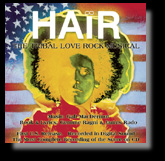 It seems that every time the world gets into a tense situation, (i.e.:
war) a resurgence of interest is sparked in one of America's
quintessential protest musical, Hair. While its book is
practically nonexistent and its themes are extremely simplistic ("War and
racism are bad, drugs and nudity are good"), its songs are catchy and
highly entertaining. Bayview Recording Company has recently released the
cast album of the 1992 Australian cast, which preserves the most complete
version of the score on CD. It is fascinating to hear a cast
that was in diapers (if born at all) when the original recording was made
in 1968. The album is definitely more polished, and the performances are
more informed than on the original version, which is both a plus and a
minus. On numbers that are more character or emotion driven, the greater
self-awareness and twinges of irony (not to mention stronger voices) add
greatly to the songs. This is especially true on "My Conviction" (which
sounds almost as if it were performed by Tracy Ulman's character, Fran),
as well as "Three-Five-Zero-Zero" and "The Flesh Failures," which remain a
chilling indictment against war. On songs that are more attitude driven,
such as "White Boys" and "I'm Black," the polish gives it a sheen of
respectability that runs opposite its counterculture roots. It seems that every time the world gets into a tense situation, (i.e.:
war) a resurgence of interest is sparked in one of America's
quintessential protest musical, Hair. While its book is
practically nonexistent and its themes are extremely simplistic ("War and
racism are bad, drugs and nudity are good"), its songs are catchy and
highly entertaining. Bayview Recording Company has recently released the
cast album of the 1992 Australian cast, which preserves the most complete
version of the score on CD. It is fascinating to hear a cast
that was in diapers (if born at all) when the original recording was made
in 1968. The album is definitely more polished, and the performances are
more informed than on the original version, which is both a plus and a
minus. On numbers that are more character or emotion driven, the greater
self-awareness and twinges of irony (not to mention stronger voices) add
greatly to the songs. This is especially true on "My Conviction" (which
sounds almost as if it were performed by Tracy Ulman's character, Fran),
as well as "Three-Five-Zero-Zero" and "The Flesh Failures," which remain a
chilling indictment against war. On songs that are more attitude driven,
such as "White Boys" and "I'm Black," the polish gives it a sheen of
respectability that runs opposite its counterculture roots.
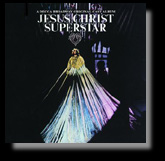 After more than three decades, the original Broadway Cast Album of Jesus
Christ Superstar
has finally been released on CD. I wish I could say
it was worth the wait, but compared to the original concept album or
even the soundtrack recording, the Broadway album pales mightily. The greatest drawback is that its forty-four minute length
preserves roughly half of the show. Even taking into account that one
almost always prefers the version one grew up listening to, the performances
just aren't, as a whole, as strong as the original cast album. The lone
standout, in fact, is Ben Vereen who delivers a smoother, catchier Judas
without sacrificing any of the emotion or power of Murray Head's throat
burning take. Yvonne Elliman, who is the lone holdover from the concept
album, makes a muddle of her big number, "I Don't Know How To Love Him,"
with odd backphrasing, and Jeff Fenholt makes a surprisingly ineffective
Jesus and lacks the passion for "Gethsemane," substituting vocal
gymnastics for honest emotion. After more than three decades, the original Broadway Cast Album of Jesus
Christ Superstar
has finally been released on CD. I wish I could say
it was worth the wait, but compared to the original concept album or
even the soundtrack recording, the Broadway album pales mightily. The greatest drawback is that its forty-four minute length
preserves roughly half of the show. Even taking into account that one
almost always prefers the version one grew up listening to, the performances
just aren't, as a whole, as strong as the original cast album. The lone
standout, in fact, is Ben Vereen who delivers a smoother, catchier Judas
without sacrificing any of the emotion or power of Murray Head's throat
burning take. Yvonne Elliman, who is the lone holdover from the concept
album, makes a muddle of her big number, "I Don't Know How To Love Him,"
with odd backphrasing, and Jeff Fenholt makes a surprisingly ineffective
Jesus and lacks the passion for "Gethsemane," substituting vocal
gymnastics for honest emotion.
-- Jonathan Frank
Make sure you check our list of Upcoming Releases.
|
|

